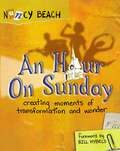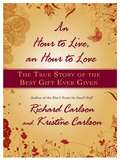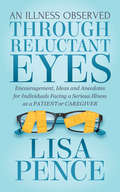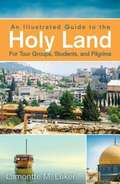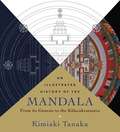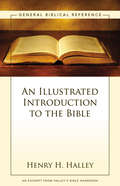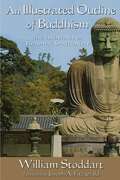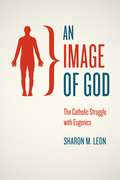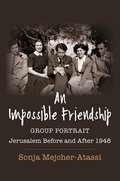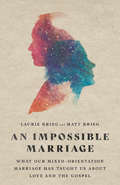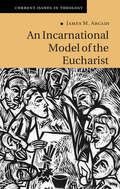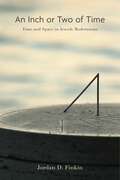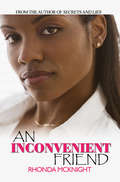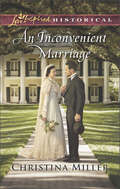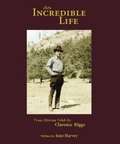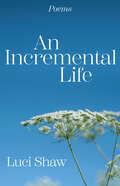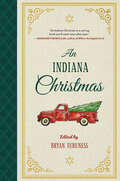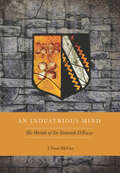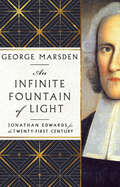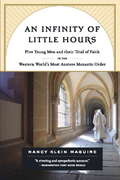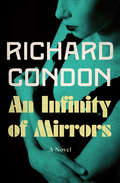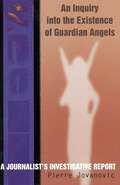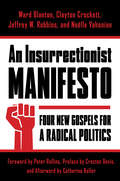- Table View
- List View
An Hour on Sunday: Creating Moments of Transformation and Wonder
by Bill Hybels Nancy BeachToday’s spiritually searching culture is less inclined than ever to attend church. Yet, no time of the week is filled with more life-changing potential than Sunday morning. Imagine . . . experiences that bring people heart-to-heart with God.messages in which God’s truth connects to everyday life.transcendent moments that leave people awestruck—and transformed. That’s what can happen when you unleash the arts in your church through the power of the Holy Spirit. An Hour on Sunday is not about nitty-gritty programming details or cookie-cutter how-to’s. It’s about foundational issues—ten enduring principles that: unite artists and ministry leaders around a common language empower artists and pastors to effectively work together create the potential for moments that matter on Sunday morning. An Hour on Sunday is for worship and arts ministry leaders, pastors and teachers, artists—including musicians, writers, dancers, actors, visual artists, film makers, light and sound engineers and anyone who believes in the limitless potential of the arts in their church. Whimsically illustrated, written with passion and humor, and filled with stories of both success and failure, An Hour on Sunday explores the deep, shaping forces that can make your hour on Sunday a time of transformation and wonder for believers and seekers alike.
An Hour to Live, an Hour to Love: The True Story of the Best Gift Ever Given
by Richard Carlson Kristine CarlsonIf you had one hour to live and could make just one phone call, who would you call? What would you say? Why are you waiting? Richard Carlson's sudden, tragic death in December 2006 left his millions of fans reeling, but even their many letters, calls, and emails couldn't erase the loss felt by his wife, Kristine. To try and come to terms with her loss, she pored over 25 years of love letters, reliving the memories and cherishing her late husband's memory. But one letter stood out. Richard had written to his wife on their 18th wedding anniversary and attempted to answer the question: if you had one hour to live, what would you do, who would you call, and what would you say? An Hour to Live, an Hour to Love is a profoundly moving book that shows the importance of treasuring each day as the incredible gift it is.
An Illness Observed Through Reluctant Eyes: Encouragement, Ideas and Anecdotes for Individuals Facing a Serious Illness as a Patient or Caregiver
by Lisa PenceAn Illness Observed Through Reluctant Eyes offers encouragement, ideas and anecdotes interwoven with humor for individuals going through or facing a serious illness as a patient or caregiver. Lisa T. Pence transports readers from the diagnosis, through the illness, to recovery with their loved one. This guide is filled with advice, humor, and suggestions to keep both caregiver and patient engaged, healthy, and hopeful for the future. Lisa&’s story makes readers laugh, brings them to tears, proposes helpful suggestions, encourages, and most of all, lets readers know they are not alone during this trying ordeal. Someone has come before them and emerged from the other side of illness alive, eternally thankful, and whole.
An Illustrated Guide to the Holy Land for Tour Groups, Students, and Pilgrims
by Lamontte M. LukerAs the geographic heart and soul of Judaism, Islam, and Christianity, the Holy Land has immense significance for the millions of visitors each year. But since the fifth century BC, enthusiastic and curious people have needed a guide as they travel to see the sites for themselves.This book is different because it not only gives the historical, archaeological descriptions wedded to the biblical text, but it is an appropriate resource for spiritual formation and cross-cultural dialog.Packed with the latest information, this book locates and introduces the reader to popular and less-familiar sites such as Bethlehem, Shepherds’ Field, Church of the Nativity, Roman Catholic Church of St. Catherine, the Herodium, Mount of Olives, Old City of Jerusalem, Wadi Kelt, Mt. Sinai, Church of the Holy Sepulchre, the site of Church of St. Mary of the Latins, Temple Mount, El-Aksa Mosque, Dome of the Rock, Hezekiah's Tunnel, the traditional place of the Last Supper, Siloam Pool, the traditional tomb of King David, the house of Caiphas the High Priest, Shrine of the Book, Herod's Antonio Fortress, Golgotha, Bethany, Tomb of Lazarus, Bethphage, Pater Noster Church, Gethsemane, and many others. Each entry explains the history and topography of the site as well as its function and significance as it is linked to the relevant biblical passages.This book will not only inform you but help you better understand your faith. Journey to the Holy Land with indispensable archaeological information linked to the biblical story.
An Illustrated History of the Mandala: From Its Genesis to the Kalacakratantra
by Kimiaki TanakaEveryone’s heard of mandalas; now we have a uniquely rich history and explanation of their history and meaning.This book is a history of the genesis and development of the mandala from the fifth and sixth centuries, when the mandala first appeared in India, to the eleventh century, when the Kalacakratantra appeared just before the disappearance of Buddhism in India. The 600 years of Indian esoteric Buddhism that concluded the 1,700-year history of Indian Buddhism could be said to have been the history of the development of the mandala. (The Kalacakratantra integrated earlier mandala theories into a single system and established a monumental system unprecedented in the history of esoteric Buddhism. It was thus the culmination of the development of Indian Buddhism over a period of 1,700 years.) The analysis is at the micro level and includes numerous illustrations and charts. Particular attention is paid to proper names, mudras, and mantras that have been overlooked by scholars in philosophy and doctrine, and the author tackles issues that cannot be explained solely from a historical viewpoint, such as geometric patterns, the arrangement of deities, the colors, and their meaning in Buddhist doctrine.
An Illustrated Introduction to the Bible: A Zondervan Digital Short
by Henry H. HalleyDerived from Halley’s Bible Handbook, a world-renowned, accessible guide to the Bible now in its twenty-fifth edition, this digital short explains simply and clearly how the Bible was written and what it is about. Readers looking for a basic introduction to the Bible or wanting a tool to teach others about it will find An Illustrated Introduction to the Bible to be a handy resource.
An Illustrated Outline of Buddhism: The Essentials of Buddhist Spirituality
by William StoddartAnIllustrated Outline of Buddhism is an ideal introduction to the vast and complex field of Buddhism, a world religion with more than a billion followers. In its short format and accessible style, it presents the essential features of the Buddhist religion with a clear yet concise style that is suitable for both the general reader and student of Buddhism. This fully color edition contains 40 color illustrations, including a stunning array of outstanding examples of Buddhist art, architecture, statuary, and calligraphy. Numerous maps, diagrams, and charts are included to illustrate important aspects of Buddhist beliefs and to summarize the different cultural forms and developmental phases of Buddhism. A select bibliography for further reading and a detailed index will also aid the reader.
An Image of God: The Catholic Struggle with Eugenics
by Sharon M. LeonDuring the first half of the twentieth century, supporters of the eugenics movement offered an image of a racially transformed America by curtailing the reproduction of “unfit” members of society. Through institutionalization, compulsory sterilization, the restriction of immigration and marriages, and other methods, eugenicists promised to improve the population—a policy agenda that was embraced by many leading intellectuals and public figures. But Catholic activists and thinkers across the United States opposed many of these measures, asserting that “every man, even a lunatic, is an image of God, not a mere animal."In An Image of God, Sharon Leon examines the efforts of American Catholics to thwart eugenic policies, illuminating the ways in which Catholic thought transformed the public conversation about individual rights, the role of the state, and the intersections of race, community, and family. Through an examination of the broader questions raised in this debate, Leon casts new light on major issues that remain central in American political life today: the institution of marriage, the role of government, and the separation of church and state. This is essential reading in the history of religion, science, politics, and human rights.
An Impossible Friendship: Group Portrait, Jerusalem Before and After 1948 (Religion, Culture, and Public Life #47)
by Sonja Mejcher-AtassiIn Jerusalem, as World War II was coming to an end, an extraordinary circle of friends began to meet at the bar of the King David Hotel. This group of aspiring artists, writers, and intellectuals—among them Wolfgang Hildesheimer, Jabra Ibrahim Jabra, Sally Kassab, Walid Khalidi, and Rasha Salam, some of whom would go on to become acclaimed authors, scholars, and critics—came together across religious lines in a fleeting moment of possibility within a troubled history. What brought these Muslim, Jewish, and Christian friends together, and what became of them in the aftermath of 1948, the year of the creation of the State of Israel and the Palestinian Nakba?Sonja Mejcher-Atassi tells the story of this unlikely friendship and in so doing offers an intimate cultural and social history of Palestine in the critical postwar period. She vividly reconstructs the vanished social world of these protagonists, tracing the connections between the specificity of individual lives and the larger contexts in which they are embedded. In exploring this ecumenical friendship and its artistic, literary, and intellectual legacies, Mejcher-Atassi demonstrates how social biography can provide a picture of the past that is at once more inclusive and more personal. This group portrait, she argues, allows us to glimpse alternative possibilities that exist within and alongside the fraught history of Israel/Palestine. Bringing a remarkable era to life through archival research and nuanced interdisciplinary scholarship, An Impossible Friendship unearths prospects for historical reconciliation, solidarity, and justice.
An Impossible Marriage: What Our Mixed-Orientation Marriage Has Taught Us About Love and the Gospel
by Laurie Krieg Matt Krieg"People say our marriage is impossible." Laurie and Matt Krieg are in a mixed-orientation marriage: a marriage in which at least one partner's primary attraction isn't toward the gender of their spouse. In the Kriegs' case, Laurie is primarily attracted to women—and so is Matt. Some find the idea of mixed-orientation marriage bewildering or even offensive. But as the Kriegs have learned, nothing is impossible with God—and that's as true of their marriage as anyone else's. In An Impossible Marriage, the Kriegs tell their story: how they met and got married, the challenges and breakthroughs of their journey, and what they've learned about marriage along the way. Christianity teaches us that marriage is a picture of Jesus’ love for the church—and that's just as true in a mixed-orientation marriage as in a straight one. With vulnerability and wisdom, this book lays out an engaging picture of marriage in all its pain and beauty. It's a picture that points us, over and over again, to the love and grace of Jesus—as marriage was always meant to do.
An Impulsive Debutante
by Michelle StylesCarlotta Charlton can't wait for her first season—until her impulsive behavior lands her right in the lap of notorious rake Tristan, Lord Thorngrafton!Tristan is cynically convinced that she's a fortune hunter. But he can't keep away from her. Several heated kisses lead to scandal and, one outraged mama later, they're on their way to Gretna Green.Catching his breath on the carriage ride to the border, Tristan decides it's time that Lottie learned her lesson. If she wants to play with fire, he'll notch up his seduction and set her ablaze!
An Incarnational Model of the Eucharist (Current Issues In Theology #10)
by James M. ArcadiThe Eucharist is at the heart of Christian worship, and at the heart of the Eucharist are the curious phrases, ‘This is my body’ and ‘This is my blood’. James M. Arcadi offers a constructive proposal for understanding Christ’s presence in the Eucharist that draws on contemporary conceptual resources and is faithful to the history of interpretation. He locates his proposal along a spectrum of Eucharistic theories. Arcadi explores the motif of God’s presence related to divine omnipresence and special presence in holy places, which undergirds a biblical–theological proposal concerning Christ’s presence. Utilizing recent work in speech-act theory, Arcadi probes the acts of consecration and renaming in their biblical and liturgical contexts. A thorough examination of recent work in Christology leads to an action model of the Incarnation that borrows the notion of enabling externalism from philosophy of mind. These threads undergird an impanation model of Christ’s presence in the Eucharist.
An Inch or Two of Time: Time and Space in Jewish Modernisms (Dimyonot)
by Jordan D. FinkinIn literary modernism, time and space are sometimes transformed from organizational categories into aesthetic objects, a transformation that can open dramatic metaphorical and creative possibilities. In An Inch or Two of Time, Jordan Finkin shows how Jewish modernists of the early twentieth century had a distinct perspective on this innovative metaphorical vocabulary. As members of a national-ethnic-religious community long denied the rights and privileges of self-determination, with a dramatically internalized sense of exile and landlessness, the Jewish writers at the core of this investigation reimagined their spatial and temporal orientation and embeddedness. They set as the fulcrum of their imagery the metaphorical power of time and space. Where non-Jewish writers might tend to view space as a given—an element of their own sense of belonging to a nation at home in a given territory—the Jewish writers discussed here spatialized time: they created an as-if space out of time, out of history. They understood their writing to function as a kind of organ of perception on its own. Jewish literature thus presents a particularly dynamic system for working out the implications of that understanding, and as such, this book argues, it is an indispensable part of the modern library.
An Inch or Two of Time: Time and Space in Jewish Modernisms (Dimyonot: Jews and the Cultural Imagination #3)
by Jordan D. FinkinIn literary modernism, time and space are sometimes transformed from organizational categories into aesthetic objects, a transformation that can open dramatic metaphorical and creative possibilities. In An Inch or Two of Time, Jordan Finkin shows how Jewish modernists of the early twentieth century had a distinct perspective on this innovative metaphorical vocabulary. As members of a national-ethnic-religious community long denied the rights and privileges of self-determination, with a dramatically internalized sense of exile and landlessness, the Jewish writers at the core of this investigation reimagined their spatial and temporal orientation and embeddedness. They set as the fulcrum of their imagery the metaphorical power of time and space. Where non-Jewish writers might tend to view space as a given—an element of their own sense of belonging to a nation at home in a given territory—the Jewish writers discussed here spatialized time: they created an as-if space out of time, out of history. They understood their writing to function as a kind of organ of perception on its own. Jewish literature thus presents a particularly dynamic system for working out the implications of that understanding, and as such, this book argues, it is an indispensable part of the modern library.
An Inconvenient Friend
by Rhonda McknightSamaria Jacobs is a deceitful, yet captivating diva who will do anything to win the heart of her married lover. Will she get her man or destroy herself and everyone else in the process?Samaria has her sights set on Gregory Preston. A successful surgeon, he has just the bankroll she needs to keep her in the lifestyle that her credit card debt has helped her grow accustomed to. He's married, but Samaria would never let a little thing like that get in her way.Samaria joins New Mercies Christian Church to get close to Gregory's wife. If she gets to know Angelina Preston, she can become like her in more than just looks, and really work her way into Greg's heart.Angelina's life is filled with a successful career and busy ministry work, but something's just not right with her marriage. Late nights, early meetings, lipstick- and perfume-stained shirts have her suspicious that Greg is doing a little more operating than she'd like. But does she have the strength to confront the only man she's ever loved and risk losing him to the other woman?Just when Samaria thinks she's got it all figured out, she finds herself drawn to Angelina's kindness. Will she be able to carry out her plan after she finds herself yearning for the one thing she's never had. . .the friendship of a woman?
An Inconvenient Marriage
by Christina MillerLast-Minute BrideWidowed reverend Samuel Montgomery is excited to start over with his daughter in Natchez, Mississippi—until he learns he’ll lose his job if he doesn’t marry. His solution: a marriage in name only to heiress Clarissa Adams, who needs a husband to win her inheritance. Though the beautiful music teacher will make a good wife, Samuel doubts he can ever truly capture her heart.Marriage satisfies only the first provision of Clarissa’s grandfather’s will, which pits her against her cousin. And fulfilling the remaining stipulations won’t be easy between caring for Samuel’s rebellious daughter and managing an orphanage. But Samuel seems determined to stand by her side…and maybe even prove their marriage could be more than just convenient.
An Incredible Life: True Stories Told by Clarence Riggs
by June HarveyReal life stories of a South Dakotan who lived in the Black Hills, near Deadwood. He works as a farmer, woodcutter, shoe salesman and many more jobs from 1920s on. He talks about storms (wind and snow), working hard, independence, community, trust and a solid belief in God's power. Warning: one chapter on hunting animals to eat.
An Incremental Life: Poems
by Luci Shaw"Luci Shaw is a legend" —Christianity TodayThis captivating collection of poems by beloved author Luci Shaw, reflects on daily ideas and activities as they arrive, bit by bit, to illuminate us with their wisdom and enlarge on the meanings of human experience. Like small messages from beyond, these incidents call us to pay attention. In An Incremental Life, Shaw breathes life into the simpleness of the every-day and finds God in the memory of the mundane. Through her verses, she explores the intricate tapestry of existence, from the tender memories of childhood to the profound questions of mortality. Her poems are like windows opening to the soul, inviting readers to pause, reflect, and savor the beauty of the world around them. INCREMENTS I live by increments, single breaths of an ambient air, marking off hours, days. Apprenticed to grace, I tread statio in sequentiae, edging every step forward before venturing the next. Staggering up towards the stony crests of the foothills, dusty, I am almost undone with weariness, only half believing that the view will widen. In my falling upward into your home, O Faithful One, stay with me, your wind music playing the ear of my mind like an instrument. "This is how life happens, one day at a time, in increments! And God is in each of them for us," Luci Shaw
An Indiana Christmas
by Bryan Furuness“A grand and thrilling selection of Hoosier writing presented through the fraught lens of Christmas . . . a fascinating and utterly enjoyable read.” —Michael Dahlie, award-winning author of The Best of YouthIn An Indiana Christmas, editor Bryan Furuness brings together timeless short stories, poems, plays, and letters to help you get into the holiday spirit. Lose yourself in classics like “In God We Trust: All Others Pay Cash” by Jean Shepherd, which inspired the beloved movie A Christmas Story, and “A Feel in the Christmas Air”by James Whitcomb Riley, along with more recent literary works like “The Myth of the Perfect Christmas Photo Family” by Kelsey Timmerman and “While Mortals Sleep” by famed Indiana writer Kurt Vonnegut. To achieve the perfect combination of Christmas nostalgia and cheer, Furuness has curated Hoosier stories that allow you to experience an idyllic holiday gathering in “Indiana Winter” by Susan Neville, feel the excitement of a child on Christmas Eve with “Earthbound” by Barbara Shoup, and face the loneliness of a drifter on Christmas night in “Howard Garfield, Balladeer” by Edward Porter. The collection even offers the chance to read a Christmas war dispatch from the late, great Hoosier journalist Ernie Pyle.Heartfelt and unique, “the stories, poems, and essays in An Indiana Christmas will stay with you long after reading, no matter the season” (Sarah Layden, author of The Story I Tell About Myself).“A curl-up book you will savor year after year.” —Margaret McMullan, author of Where the Angels Lived
An Industrious Mind: The Worlds of Sir Simonds D'Ewes
by J. Sears McgeeThis is the first biography of Sir Simonds D'Ewes, a member of England's Long Parliament, Puritan, historian and antiquarian who lived from 1602-1650. D'Ewes took the Puritan side against the supporters of King Charles I in the English Civil War, and his extensive journal of the Long Parliament, together with his autobiography and correspondence, offer a uniquely comprehensive view of the life of a seventeenth-century English gentleman, his opinions, thoughts and prejudices during this tumultuous time. D'Ewes left the most extensive archive of personal papers of any individual in early modern Europe. His life and thought before the Long Parliament are carefully analyzed, so that the mind of one of the Parliamentarian opponents of King Charles I's policies can be understood more fully than that of any other Member of Parliament. Although conservative in social and political terms, D'Ewes's Puritanism prevented him from joining his Royalist younger brother Richard during the civil war that began in 1642. D'Ewes collected one of the largest private libraries of books and manuscripts in England in his era and used them to pursue historical and antiquarian research. He followed news of national and international events voraciously and conveyed his opinions of them to his friends in many hundreds of letters. McGee's biography is the first thorough exploration of the life and ideas of this extraordinary observer, offering fresh insight into this pivotal time in European history.
An Infinite Fountain of Light: Jonathan Edwards for the Twenty-First Century
by George M. MarsdenChristians need to pause once in a while to get their bearings. For perspective on our own times and how we got here, it helps to listen to wise guides from other eras. In An Infinite Fountain of Light, the renowned American historian George Marsden illuminates the landscape with wisdom from one such mentor: Jonathan Edwards. Drawing on his deep expertise on Edwards and American culture, Marsden explains where Edwards stood within his historical context and sets forth key points of his complex thought. By also considering Benjamin Franklin and George Whitefield, two of Edwards's most influential contemporaries, Marsden unpacks the competing cultural and religious impulses that have shaped our times. In contrast, Edwards offered us an exhilarating view of the centrality of God's beauty and love. Christians' love for God, he taught, can be the guiding love of our lives, opening us to transformative joy and orienting all our lesser loves. "There is an infinite fullness of all possible good in God, a fullness of every perfection, of all excellency and beauty, and of infinite happiness," wrote Edwards. "This infinite fountain of light should, diffusing its excellent fullness, pour forth light all around." With Marsden's guidance, readers will discover how Edwards's insights can renew our own vision of the divine, of creation, and of ourselves.
An Infinity of Little Hours: Five Young Men and Their Trial of Faith in the Western World's Most Austere Monastic Order
by Nancy Klein MaguireIn 1960, five young men arrived at the imposing gates of Parkminster, the largest center of the most rigorous and ascetic monastic order in the Western world: the Carthusians. This is the story of their five-year journey into a society virtually unchanged in its behavior and lifestyle since its foundation in 1084. An Infinity of Little Hours is a uniquely intimate portrait of the customs and practices of a monastic order almost entirely unknown until now. It is also a drama of the men's struggle as they avoid the 1960s-the decade of hedonism, music, fashion, and amorality-and enter an entirely different era and a spiritual world of their own making. After five years each must face a choice: to make "solemn profession" and never leave Parkminster; or to turn his back on his life's ambition to find God in solitude. A remarkable investigative work, the book combines first-hand testimony with unique source material to describe the Carthusian life. And in the final chapter, which recounts a reunion forty years after the events described elsewhere in the book, Nancy Klein Maguire reveals which of the five succeeded in their quest, and which did not.
An Infinity of Mirrors
by Richard CondonA Jewish woman in love with a Prussian officer moves to Hitler&’s Berlin in this ominous, &“spectacular&” novel by the New York Times–bestselling author (Kirkus Reviews). Every afternoon, Paule tends to her father&’s newspaper clippings and listens to his stories. An actor, Paul-Alain Bernheim has a sexual appetite and a lust for life that have made him a legend of the Paris stage. He is also a fiercely proud Jew, and he has imbued his daughter with an unshakeable pride in the history of her people. So why, she wonders, has she fallen in love with a German? From the moment Paule spots Wilhelm von Rhode at an embassy reception, she can&’t take her eyes off him. So after a whirlwind Paris romance, when von Rhode is recalled to Berlin, Paule follows as his wife. But as the Nazis tighten their stranglehold on Germany and the world prepares for war, their love may not survive what is to come. &“Fascinating.&” —Life
An Inquiry into the Existence of Guardian Angels: A Journalist's Investigative Report
by Pierre JovanovicA journalist's extensive investigation in the areas of near-death experiences, supernatural interventions and guardian angels.
An Insurrectionist Manifesto: Four New Gospels for a Radical Politics (Insurrections: Critical Studies in Religion, Politics, and Culture)
by Clayton Crockett Ward Blanton Jeffrey Robbins Noëlle VahanianAn Insurrectionist Manifesto contains four insurrectionary gospels based on Martin Heidegger's philosophical model of the fourfold: earth and sky, gods and mortals. Challenging religious dogma and dominant philosophical theories, they offer a cooperative, world-affirming political theology that promotes new life through not resurrection but insurrection. The insurrection in these gospels unfolds as a series of miraculous yet worldly practices of vital affirmation. Since these routines do not rely on fantasies of escape, they engender intimate transformations of the self along the very coordinates from which they emerge. Enacting a comparative and contagious postsecular sensibility, these gospels draw on the work of Slavoj i ek, Giorgio Agamben, Catherine Malabou, François Laruelle, Peter Sloterdijk, and Gilles Deleuze yet rejuvenate scholarship in continental philosophy, critical race theory, the new materialisms, speculative realism, and nonphilosophy. They think beyond the sovereign force of the one to initiate a radical politics "after" God.
